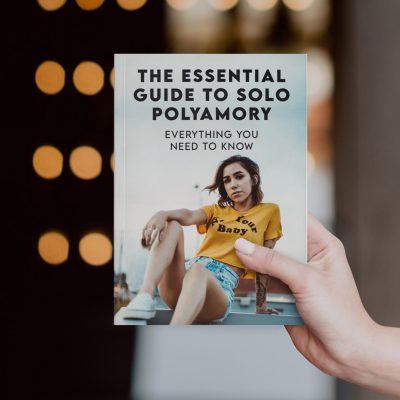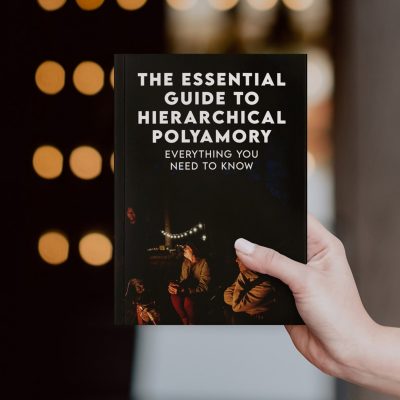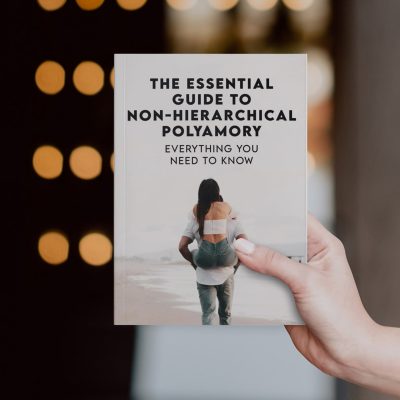Can I Be Polyamorous?

In today's world, as societal norms continue to shift and expand, more and more people are asking the same question: "Can I be polyamorous?" The idea of having multiple romantic and emotional partners simultaneously is exciting and enticing for many, but is it the right choice for you and your relationships? In this post, we will delve into the world of polyamory and provide you with the information you need to make an informed decision about whether or not you should explore this non-monogamous lifestyle.
Quick Links to Useful Sections
Polyamory is a form of non-monogamy that allows individuals to have multiple romantic partners with the knowledge and consent of all parties involved. It is defined by open communication, trust, and honesty among everyone involved. This type of relationship structure can manifest in many different ways, from hierarchical relationships with a primary partner and secondary partners to non-hierarchical relationships without any built-in prioritization.
If you are considering polyamory, it's essential to be honest with yourself about your reasons for wanting to explore this lifestyle and recognize that it isn't a one-size-fits-all approach. To determine if polyamory may work for you, consider the following factors:
Self-awareness and emotional intelligence
Before entering a polyamorous situation, you should have a strong understanding of your emotions, needs, and boundaries. This will help you communicate with your partners effectively and maintain healthy relationships.
Time management
Juggling multiple relationships can be time-consuming, and it's crucial to have the ability to manage your time efficiently. Can you balance work, personal life, and multiple romantic and emotional connections?

Love is infinite, but your calendar is brutally finite. The fantasy is deep connection; the reality is often just exhausted "calendar tetris." Promising time you don't actually have isn't romantic, it’s a recipe for burnout and broken trust. That sinking feeling when you have to cancel again? That’s the sound of overextension destroying your relationships.
This calculator forces you to confront the math of your life. Do you actually have space for another heart, or are you just setting everyone up for disappointment?

The fantasy is total autonomy and connection. The reality? It can feel like drowning in scheduling chaos and misunderstood expectations. That anxiety you feel isn’t just stress; it’s the wobble of living without a default "anchor." Without a solid architecture, Solo Polyamory stops being a life design and starts being a recipe for burnout and confusion.
The Essential Guide replaces the drift with a concrete anchor. We provide the "Solo Ethic," boundary scripts, and burnout protocols needed to protect your peace. Don't just date around—build a life that actually works for you.

Hierarchy sounds like a corporate org chart until someone gets their feelings hurt. That stomach-turning fear that you are just a "secondary" who can be fired at any time is real. If your relationship feels like a secret ranking system, you are doing it wrong.
Ambiguity is where resentment grows. The Essential Guide replaces the "who matters more" panic with a concrete charter. We provide the scripts and equity guardrails needed to protect every heart in the polycule. Stop guessing and start building.

The ideal is pure equality. The reality? It often slides into hidden rankings where someone gets hurt. That sinking feeling that you are secretly a "secondary" despite the label? That is your intuition detecting couple privilege. Ambiguity is where resentment thrives.
The Essential Guide replaces vague promises with concrete governance. We provide the charters, equity tools, and jealousy protocols needed to ensure "non-hierarchical" isn't just a fantasy. Stop guessing who matters most. Build a network that is actually fair.

The fantasy is total autonomy and connection. The reality? It can feel like drowning in scheduling chaos and misunderstood expectations. That anxiety you feel isn’t just stress; it’s the wobble of living without a default "anchor." Without a solid architecture, Solo Polyamory stops being a life design and starts being a recipe for burnout and confusion.
The Essential Guide replaces the drift with a concrete anchor. We provide the "Solo Ethic," boundary scripts, and burnout protocols needed to protect your peace. Don't just date around—build a life that actually works for you.

Hierarchy sounds like a corporate org chart until someone gets their feelings hurt. That stomach-turning fear that you are just a "secondary" who can be fired at any time is real. If your relationship feels like a secret ranking system, you are doing it wrong.
Ambiguity is where resentment grows. The Essential Guide replaces the "who matters more" panic with a concrete charter. We provide the scripts and equity guardrails needed to protect every heart in the polycule. Stop guessing and start building.
Communication skills
Effective communication is the cornerstone of successful polyamorous relationships. You must be comfortable discussing your feelings, needs, and boundaries – and willing to listen and be empathetic with your partners.
Trust and honesty
Trust and honesty are vital components of polyamory. You must be open and honest with all your partners and trust that they will do the same for you. Without trust, jealousy, and insecurity can quickly tear apart your relationships.
Emotional resilience
In polyamorous relationships, there is potential for more emotional ups and downs. Can you handle a higher degree of emotional fluctuation without becoming overwhelmed?
Example
Let's say we have a person named Alex who has been interested in polyamory for some time. They have been in a monogamous relationship for a few years but have always felt a longing to build connections with multiple people. After discussing their feelings with their partner, they both decide to try opening up their relationship.
To explore polyamory, Alex and their partner start attending local polyamory meetups and engaging in online forums. They read literature about polyamory, build friendships with other polyamorous individuals, and gradually begin forming new romantic connections. As they navigate this new world, they continuously communicate with their partner, always ensuring that they are feeling emotionally supported and secure.
Throughout their journey into polyamory, Alex discovers that they can handle multiple relationships and embraces non-monogamy as a part of their identity. They find joy in the new connections they have made and feel fulfilled in their romantic life.
Polyamory can be a wonderfully enriching and fulfilling way of living for those who find it the right fit for themselves and their relationships. If you think you may be interested in polyamory, take the time to educate yourself, and explore the possibilities with openness and honesty. Remember, there is no right or wrong way to be in a relationship – only what works best for you and your partners.
We hope that this guide has given you some valuable insights into the world of polyamory. If you found it helpful, please share with friends and family who may be curious about the topic. For more information on polyamory, monogamy, and an array of other subjects, explore the Monogamy Experiment blog today.

Love is infinite, but your calendar is brutally finite. The fantasy is deep connection; the reality is often just exhausted "calendar tetris." Promising time you don't actually have isn't romantic, it’s a recipe for burnout and broken trust. That sinking feeling when you have to cancel again? That’s the sound of overextension destroying your relationships.
This calculator forces you to confront the math of your life. Do you actually have space for another heart, or are you just setting everyone up for disappointment?

The fantasy is total autonomy and connection. The reality? It can feel like drowning in scheduling chaos and misunderstood expectations. That anxiety you feel isn’t just stress; it’s the wobble of living without a default "anchor." Without a solid architecture, Solo Polyamory stops being a life design and starts being a recipe for burnout and confusion.
The Essential Guide replaces the drift with a concrete anchor. We provide the "Solo Ethic," boundary scripts, and burnout protocols needed to protect your peace. Don't just date around—build a life that actually works for you.

Hierarchy sounds like a corporate org chart until someone gets their feelings hurt. That stomach-turning fear that you are just a "secondary" who can be fired at any time is real. If your relationship feels like a secret ranking system, you are doing it wrong.
Ambiguity is where resentment grows. The Essential Guide replaces the "who matters more" panic with a concrete charter. We provide the scripts and equity guardrails needed to protect every heart in the polycule. Stop guessing and start building.

The ideal is pure equality. The reality? It often slides into hidden rankings where someone gets hurt. That sinking feeling that you are secretly a "secondary" despite the label? That is your intuition detecting couple privilege. Ambiguity is where resentment thrives.
The Essential Guide replaces vague promises with concrete governance. We provide the charters, equity tools, and jealousy protocols needed to ensure "non-hierarchical" isn't just a fantasy. Stop guessing who matters most. Build a network that is actually fair.

The fantasy is total autonomy and connection. The reality? It can feel like drowning in scheduling chaos and misunderstood expectations. That anxiety you feel isn’t just stress; it’s the wobble of living without a default "anchor." Without a solid architecture, Solo Polyamory stops being a life design and starts being a recipe for burnout and confusion.
The Essential Guide replaces the drift with a concrete anchor. We provide the "Solo Ethic," boundary scripts, and burnout protocols needed to protect your peace. Don't just date around—build a life that actually works for you.

Hierarchy sounds like a corporate org chart until someone gets their feelings hurt. That stomach-turning fear that you are just a "secondary" who can be fired at any time is real. If your relationship feels like a secret ranking system, you are doing it wrong.
Ambiguity is where resentment grows. The Essential Guide replaces the "who matters more" panic with a concrete charter. We provide the scripts and equity guardrails needed to protect every heart in the polycule. Stop guessing and start building.
Aging And Long Term Care Planning As Solo Poly
Attachment Styles And Solo Polyamory
Autonomy And Self Partnership As Foundations
Avoiding Avoidance Disguised As Autonomy
Avoiding Being Treated As An Accessory Relationship
Balancing Independence And Intimacy
Balancing Multiple Partners Without Burnout
Barrier Use Conversations With Multiple Partners
Boundaries Versus Rules In Solo Poly Relationships
Breakups And Grief While Staying Solo
Building Emotional Availability As Solo Poly
Caregiving And Illness Support Without A Nesting Partner
Co Parenting Agreements And Boundaries
Co Parenting And Family Building As Solo Poly
Coming Out As Solo Polyamorous
Common Mistakes Partners Make With Solo Poly People
Common Mistakes Solo Poly People Make
Common Myths About Solo Polyamory
Communication Check Ins That Fit Solo Poly
Community And Chosen Family For Solo Poly People
Compersion And Neutrality Toward Partner Dating
Conflict Resolution Without Couple Default
Core Values Of Solo Polyamory
Creating Agreements That Preserve Independence
Creating Secure Attachment Without Traditional Milestones
Dating People Who Want Escalation
De Escalation As A Healthy Choice
Decentering Couple Norms And Escalator Scripts
Deciding Whether Solo Polyamory Is Right For You
Defining Relationship Depth Without Shared Living
Defining Success Without Traditional Milestones
Designing A Sustainable Solo Poly Life
Digital Safety And Privacy
Disability And Access Needs As Solo Poly
Emergency Contacts And Support Planning
End Of Life Planning And Legal Documents
Energy Management And Overextension Risks
Financial Independence And Entanglement Decisions
Finding Solo Poly Friendly Community
Friendships As Core Support Structures
Gifts Trips And Resource Boundaries
Handling Being The Newest Partner
Handling Judgment From Monogamous Culture
Handling Judgment From Poly Communities
Handling Last Minute Plan Changes
Holidays And Special Occasions As Solo Poly
Housing Choices And Living Alone
How To Disclose Solo Polyamory Early While Dating
How To Explain Solo Polyamory To Partners
In Person Events And Support Networks
Intersectionality In Solo Poly Experiences
Long Distance Relationships And Solo Poly
Maintaining Rituals Without Domestic Integration
Maintaining Self Partnership Through Loss
Managing Insecurity Without Default Reassurance
Managing Metamour Dynamics Without Centering A Couple
Managing Nre Without Losing Yourself
Navigating Jealousy As A Solo Poly Person
Navigating Marriage Offers As Solo Poly
Navigating Partners With Nesting Or Spouses
Pacing New Connections Ethically
Parallel Versus Kitchen Table Preferences
Parenting Without A Primary Partner Model
Pregnancy And Fertility Conversations For Solo Poly
Privacy And Information Sharing Consent
Processing Loneliness While Staying Solo
Protecting Personal Time Without Withholding Connection
Quality Time When You Do Not Share A Home
Race Gender And Class Factors In Solo Poly
Religion Culture And Family Expectations
Relocation And Maintaining Connections
Repair After Misunderstandings With Partners
Responding To Requests For Primary Status
Risk Profiles And Informed Consent
Screening For People Who Respect Autonomy
Self Worth Outside Relationship Status
Setting Expectations With Highly Partnered People
Sexual Health Agreements As A Solo Poly Person
Shared Housing With Friends And Community
Signs Solo Polyamory Is Working Well
Social Media Boundaries And Visibility
Solo Polyamory And Career Mobility
Solo Polyamory And Commitment
Solo Polyamory And Mental Health Support
Solo Polyamory And Metamour Relationships
Solo Polyamory Versus Being Single
Solo Polyamory Versus Non Hierarchical Polyamory
Solo Polyamory Versus Relationship Anarchy
Substance Use Boundaries And Consent
Testing Schedules And Disclosure Practices
The History And Evolution Of Solo Polyamory
Therapy And Coaching For Solo Polyamory
Time And Scheduling As A Solo Poly Person
Transparency Without Being Managed
Travel And Overnights Without Implied Escalation
Warning Signs Of Isolation Masquerading As Autonomy
What Commitment Looks Like Without Nesting
What Solo Polyamory Is And What It Is Not
Why People Choose Solo Polyamory
Writing A Solo Poly Dating Profile
Accountability When Harm Occurs
Aging And Long Term Planning
Alternatives To Veto Policies
Attachment Styles And Hierarchy
Avoiding Disposable Partner Dynamics
Avoiding Entitlement In Primary Relationships
Avoiding Objectification And Ranking Language
Blended Families And Co Parenting Dynamics
Boundaries Versus Rules In Hierarchical Contexts
Caregiving And Illness Decisions
Choosing Hierarchy Intentionally
Common Challenges Faced By Secondary Partners
Common Mistakes Primary Partners Make
Common Mistakes Secondary Partners Make
Common Myths About Hierarchical Polyamory
Communicating Limits Without Devaluing Others
Community Perception Of Hierarchical Polyamory
Compersion When Time And Resources Are Unequal
Consent And Transparency In Hierarchy
Consent Under Unequal Power Dynamics
Cultural And Socioeconomic Influences On Hierarchy
De Escalation Without Punishment
Deciding Whether Hierarchical Polyamory Is Right For You
Decision Making Power In Primary Relationships
Descriptive Versus Prescriptive Hierarchy
Emotional Labor Distribution Across Partners
Emotional Regulation Skills For Hierarchical Dynamics
Emotional Safety For Non Primary Partners
Ending Relationships Ethically Within Hierarchy
Ethical Foundations Of Hierarchical Structures
Ethical Storytelling About Hierarchical Relationships
Ethical Use Of Veto Power
Fear Of Replacement Or Demotion
Financial Transparency With Multiple Partners
Handling Breakups Within A Hierarchical System
Hierarchy Versus Relationship Anarchy
Holidays Vacations And Special Occasions
How Hierarchical Polyamory Differs From Non Hierarchical Polyamory
How Hierarchical Polyamory Evolves Over Time
How Privilege Shows Up In Daily Decisions
How To Disclose Hierarchy Early In Dating
Inclusion Versus Exclusion Practices
Integrating Hierarchy With Personal Values
Integrating New Partners Ethically
Intersectionality And Power In Hierarchy
Jealousy In Hierarchical Polyamory
Legal Risks And Protections
Lessons Hierarchical Polyamory Teaches About Love
Letting Go Of Hierarchy When It No Longer Fits
Living Together Versus Living Apart
Long Distance Relationships Within Hierarchy
Managing Boundary Violations
Managing Comparison Between Partners
Marriage And Legal Privilege In Hierarchical Polyamory
Measuring Fulfillment Beyond Priority Status
Navigating Attachment As A Secondary Partner
Navigating Conflicts Between Partners At Different Levels
Navigating Judgment From Non Hierarchical Communities
Ongoing Check Ins Across Relationship Levels
Opening Or Closing The Hierarchy
Parenting And Family Planning Within Hierarchy
Power Imbalances Inherent In Hierarchy
Pregnancy And Parenting Transitions
Primary Secondary And Tertiary Relationship Definitions
Privacy And Information Flow
Re Negotiating Hierarchy After Major Life Events
Rebuilding Trust After Structural Changes
Renegotiating Primary Agreements Over Time
Repair Conversations After Hierarchical Tension
Repairing Harm Caused By Hierarchical Decisions
Resentment And Unspoken Grief
Responsibilities And Expectations Of Primary Partners
Rules That Protect Versus Rules That Control
Scheduling Fairness Versus Equality
Self Worth Outside Relationship Rank
Setting Clear Expectations With New Partners
Shared Finances And Resource Prioritization
Signs Hierarchy Is Functioning Well
Supporting Mental Health Across The Network
Supporting Secondary Partners Through Transitions
The Origins And History Of Hierarchical Polyamory
The Role Of Nesting Partners
Therapy And Coaching For Hierarchical Polyamory
Time Allocation And Scheduling Priorities
Transparency Without Oversharing
Treating All Partners As Whole People
Understanding Couple Privilege
Warning Signs Of Unhealthy Hierarchy
What Hierarchical Polyamory Is And What It Is Not
What It Means To Be A Primary Partner
What It Means To Be A Secondary Partner
What People Wish They Knew Earlier
What Success Looks Like In Hierarchical Polyamory
When Hierarchy Activates Past Trauma
When Hierarchy Becomes Coercive
When Hierarchy Emerges Without Intention
When Primary Relationships Change
When Professional Support Is Needed
When Secondary Relationships Deepen
Why Hierarchy Exists In Some Polyamorous Relationships
Accountability When Harm Occurs
Aging And Long Term Planning
Alternatives To Veto Policies
Attachment Styles And Hierarchy
Avoiding Disposable Partner Dynamics
Avoiding Entitlement In Primary Relationships
Avoiding Objectification And Ranking Language
Blended Families And Co Parenting Dynamics
Boundaries Versus Rules In Hierarchical Contexts
Caregiving And Illness Decisions
Choosing Hierarchy Intentionally
Common Challenges Faced By Secondary Partners
Common Mistakes Primary Partners Make
Common Mistakes Secondary Partners Make
Common Myths About Hierarchical Polyamory
Communicating Limits Without Devaluing Others
Community Perception Of Hierarchical Polyamory
Compersion When Time And Resources Are Unequal
Consent And Transparency In Hierarchy
Consent Under Unequal Power Dynamics
Cultural And Socioeconomic Influences On Hierarchy
De Escalation Without Punishment
Deciding Whether Hierarchical Polyamory Is Right For You
Decision Making Power In Primary Relationships
Descriptive Versus Prescriptive Hierarchy
Emotional Labor Distribution Across Partners
Emotional Regulation Skills For Hierarchical Dynamics
Emotional Safety For Non Primary Partners
Ending Relationships Ethically Within Hierarchy
Ethical Foundations Of Hierarchical Structures
Ethical Storytelling About Hierarchical Relationships
Ethical Use Of Veto Power
Fear Of Replacement Or Demotion
Financial Transparency With Multiple Partners
Handling Breakups Within A Hierarchical System
Hierarchy Versus Relationship Anarchy
Holidays Vacations And Special Occasions
How Hierarchical Polyamory Differs From Non Hierarchical Polyamory
How Hierarchical Polyamory Evolves Over Time
How Privilege Shows Up In Daily Decisions
How To Disclose Hierarchy Early In Dating
Inclusion Versus Exclusion Practices
Integrating Hierarchy With Personal Values
Integrating New Partners Ethically
Intersectionality And Power In Hierarchy
Jealousy In Hierarchical Polyamory
Legal Risks And Protections
Lessons Hierarchical Polyamory Teaches About Love
Letting Go Of Hierarchy When It No Longer Fits
Living Together Versus Living Apart
Long Distance Relationships Within Hierarchy
Managing Boundary Violations
Managing Comparison Between Partners
Marriage And Legal Privilege In Hierarchical Polyamory
Measuring Fulfillment Beyond Priority Status
Navigating Attachment As A Secondary Partner
Navigating Conflicts Between Partners At Different Levels
Navigating Judgment From Non Hierarchical Communities
Ongoing Check Ins Across Relationship Levels
Opening Or Closing The Hierarchy
Parenting And Family Planning Within Hierarchy
Power Imbalances Inherent In Hierarchy
Pregnancy And Parenting Transitions
Primary Secondary And Tertiary Relationship Definitions
Privacy And Information Flow
Re Negotiating Hierarchy After Major Life Events
Rebuilding Trust After Structural Changes
Renegotiating Primary Agreements Over Time
Repair Conversations After Hierarchical Tension
Repairing Harm Caused By Hierarchical Decisions
Resentment And Unspoken Grief
Responsibilities And Expectations Of Primary Partners
Rules That Protect Versus Rules That Control
Scheduling Fairness Versus Equality
Self Worth Outside Relationship Rank
Setting Clear Expectations With New Partners
Shared Finances And Resource Prioritization
Signs Hierarchy Is Functioning Well
Supporting Mental Health Across The Network
Supporting Secondary Partners Through Transitions
The Origins And History Of Hierarchical Polyamory
The Role Of Nesting Partners
Therapy And Coaching For Hierarchical Polyamory
Time Allocation And Scheduling Priorities
Transparency Without Oversharing
Treating All Partners As Whole People
Understanding Couple Privilege
Warning Signs Of Unhealthy Hierarchy
What Hierarchical Polyamory Is And What It Is Not
What It Means To Be A Primary Partner
What It Means To Be A Secondary Partner
What People Wish They Knew Earlier
What Success Looks Like In Hierarchical Polyamory
When Hierarchy Activates Past Trauma
When Hierarchy Becomes Coercive
When Hierarchy Emerges Without Intention
When Primary Relationships Change
When Professional Support Is Needed
When Secondary Relationships Deepen
Why Hierarchy Exists In Some Polyamorous Relationships
Lost & confused by all of the terms, types and seemingly made up 3 letter acronyms?? We've got you. Check out our Ethnical Non-Monogamy Dictionary >>
Useful Interruption: Not sure which relationship vibe fits you best? Take the Ultimate Relationship Test, it will give you details into your natural relationship style. Then, dive into our binge-worthy guides, from the tried-and-true to the “wait, that’s a thing?", and find the perfect relationship type for your life.
Now back to the main article but yeah take the Ultimate Relationship Test
